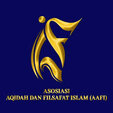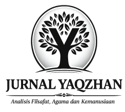ANALISIS BAHASA AGAMA DALAM KEHIDUPAN BERAGAMA MENURUT ALIRAN POSITIVISME LOGIS
(1) Universitas Jenderal Soedirman
(2) IAIN Syekh Nurjati
(*) Corresponding Author
Abstract
Keywords
Full Text:
PDFReferences
Aalsvoort, Joke Van. “Logical Positivism as a Tool to Analyse the Problem of Chemistry’s Lack of Relevance in Secondary School Chemical Education.†International Journal of Science Education 26, no. 9 (July 1, 2004): 1151–68. https://doi.org/10.1080/0950069042000205369.
Ali, Nuraliah. “Measuring Religious Moderation Among Muslim Students at Public Colleges in Kalimantan Facing Disruption Era.†INFERENSI: Jurnal Penelitian Sosial Keagamaan 14, no. 1 (2020): 1–24. https://doi.org/10.18326/infsl3.v14i1.1-24.
Arifin, Lalu Muhammad Syamsul. “Filsafat Positivisme Aguste Comte Dan Relevansinya Dengan Ilmu-Ilmu Keislaman.†Interaktif: Jurnal Ilmu-Ilmu Sosial 12, no. 2 (2020): 55–72.
Armstrong, Karen. A History of God The 4, 000 Year Quest of Judaism, Christianity and Islam. New York: Ballantine Books, 1993.
Callard, Agnes. “Everyone Desires the Good: Socrates’ Protreptic Theory of Desire Agnes Callard,†no. 2006 (2015): 1–22.
Emmrich, Martin. “A Prelude to the Pentateuch and the History of Israel.†Evangelical Quarterly 73 (2001): 3–20. https://www.biblicalstudies.org.uk/pdf/eq/2001-1_003.pdf.
Franssen, Trijsje. “Prometheus through the Ages,†2014, 1–254.
Hanifiyah, Fitriyatul. “Konsep Bahasa Agama: Sebuah Kajian Hermeneutik Dalam Perspektif Komaruddin Hidayat.†AT-TURAS: Jurnal Studi Keislaman 7, no. 2 (2020): 179–90. https://doi.org/10.33650/at-turas.v7i2.1250.
Hidayat, Ahmad. Filsafat Bahasa Mengungkap Hakikat Bahasa, Makna Dan Tanda. Bandung: PT Remaja Rosdakarya, 2000.
Hijroh Mukhlis, Febri. “Model Penelitian Kalam; Teologi Islam (Ilmu Kalam) Ahmad Hanafi.†Dialogia: Jurnal Studi Islam Dan Sosial 13, no. 2 (2015): 177–90. http://jurnal.iainponorogo.ac.id/index.php/dialogia/article/view/293.
Komaruddin, Hidayat. Memahami Bahasa Agama. Jakarta: Paramadina, 1996.
Kung, Hans. Does God Exist? London: SCM Press Ltd, 1949.
Laera, Margherita. “Reaching Athens Performing Participation and Community in Rimini Protokoll’s Prometheus in Athens.†Performance Research 16, no. 4 (December 1, 2011): 46–51. https://doi.org/10.1080/13528165.2011.606049.
Nugroho, Irham. “Positivisme Auguste Comte: Analisa Epistemologis Dan Nilai Etisnya Terhadap Sains.†Cakrawala: Jurnal Studi Islam 11, no. 2 (2016): 167–77. https://doi.org/10.31603/cakrawala.v11i2.192.
Popper, Karl. The Logic of Scientific Discovery, 2002. http://books.google.com/books?hl=en&lr=&id=T76Zd20IYlgC&pgis=1.
Pretorius, Mark. “The Creation and the Fall of Adam and Eve: Literal, Symbolic, or Myth?†Conspectus: The Journal of the South African Theological Seminary 12, no. 09 (2011): 161–84.
Rifai, Afga Sidiq. “Kebenaran Dan Keraguan Dalam Studi Keislaman (Telaah Pemikiran Charles Sander Peirce Dalam Buku Contemporary Analytic Philoshophy).†Jurnal Penelitian Agama 20, no. 1 (2019): 95–109. https://doi.org/10.24090/jpa.v20i1.2019.pp95-109.
Sugiyono. Metode Penelitian Kuantitatif, Kualitatif Dan R&D. Bandung: Alfabeta, 2016.
Susanti, Eri. “Aliran-Aliran Dalam Pemikiran Kalam.†Jurnal Ad-Dirasah 1 (2018): 1–20. https://bit.ly/3nRn2vJ.
Tamrin, Abu. “Relasi Ilmu, Filsafat Dan Agama Dalam Dimensi Filsafat Ilmu.†SALAM: Jurnal Sosial Dan Budaya Syar-I 6, no. 1 (2019): 71–96. https://doi.org/10.15408/sjsbs.v6i1.10490.
Toban, Yansar. “Kejadian 3:1-15 Kejatuhan Manusia.†Society 2, no. 1 (2019): 1–19.
DOI: 10.24235/jy.v8i2.11771
Article Metrics
Abstract view : 128 timesPDF - 13 times
Refbacks
- There are currently no refbacks.
Jurnal Yaqzhan: Analisis Filsafat, Agama dan Kemanusiaan Indexed By:
EDITORIAL OFFICE:
UIN Siber Syekh Nurjati Cirebon. Perjuangan Street of Sunyaragi, Cirebon City, West Java, Indonesia 45132 Phone. 0231-489926.

Jurnal Yaqzhan: Analisis Filsafat, Agama dan Kemanusiaan is licensed under a Creative Commons 4.0 International License.





3.png)

.png)





